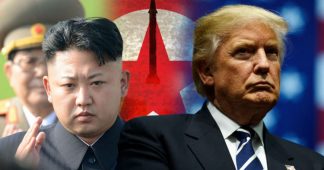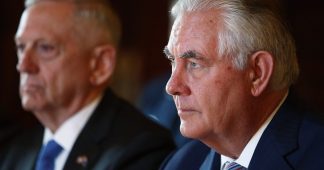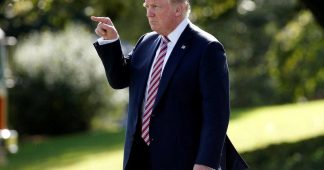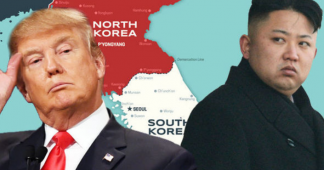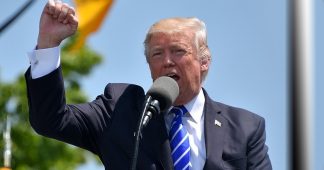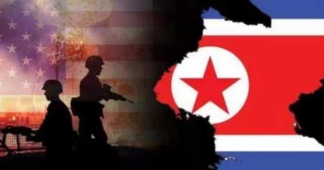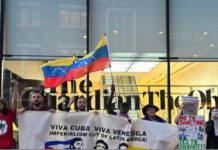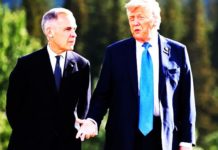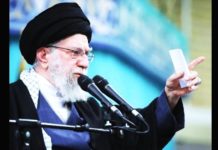By Peter Symonds
7 October 2017
Surrounded by top military leaders at the White House Thursday evening, US President Donald Trump ominously described the current world situation as “the calm before the storm.” While he refused to be more specific, Trump’s menacing remark—almost certainly directed against North Korea—is another warning that the US is on the brink of launching a catastrophic war.
Far from being off-the-cuff, Trump made the comments to a hastily-convened photo-op before a dinner with “the world’s greatest military people” and their wives. Defence Secretary James Mattis, National Security Adviser H.R. McMaster, Joint Chiefs of Staff chairman Joseph Dunford and Homeland Security Secretary John Kelly were all present.
The US president, who had just met with the generals, brushed aside subsequent repeated questions from reporters asking: “What storm?” Trump finally declared: “You’ll find out.”
In his opening remarks to the earlier meeting, Trump directed his most threatening remarks at North Korea, declaring: “We cannot allow this dictatorship to threaten our nation or our allies with unimaginable loss of life. We will do what we must do to prevent that from happening.”
Trump underscored the last point by adding: “And it will be done, if necessary—believe me.”
In reality, it is the Trump administration, not the North Korean regime, which is chiefly responsible for the extremely tense situation on the Korean Peninsula. Trump who is commander-in-chief of the world’s most powerful military apparatus has repeatedly threatened the small, economically backward country with annihilation.
Trump followed up his fascistic speech at the UN last month, warning North Korea faced “total destruction,” by tweeting that North Korea’s leader Kim Jong-un “won’t be around much longer.” He has effectively ruled out negotiations with North Korea, publicly rebuking US Secretary of State Rex Tillerson last weekend for “wasting his time” by exploring the possibility of talks with Pyongyang.
The extreme danger of war with North Korea is exacerbating divisions within ruling circles in Washington and the White House itself. The differences are tactical in character. Tillerson, Defence Secretary Mattis and National Security Adviser McMaster have all warned North Korea that “the military option is on the table.” At the same time, they have emphasised the need for a diplomatic solution to the confrontation.
All three of Trump’s top advisers have also supported the 2015 agreement reached with Iran to severely limit its nuclear programs. Trump, on the other hand, has slammed the deal as one of “the worse and most one-sided transactions” that the US has ever struck. He is reportedly poised to decertify the agreement next week—a move that will lead to escalating tensions with Tehran and also with Washington’s European allies that support the deal.
Under these conditions, Trump’s meeting on Thursday with his top generals appears aimed at ensuring full support, above all, for his reckless and aggressive preparations for war with North Korea. In his remarks before the discussion, Trump declared he expected those assembled to provide him “with a broad range of military options… at a much faster pace.” He made clear the generals were in charge, declaring he was relying on them “to overcome the obstacles of bureaucracy.”
What is at stake in a US war with North Korea was underscored yesterday by Democrat congressman Ted Lieu. He warned that a conflict with North Korea would be “unbelievably bloody.” While condemning the Pyongyang regime as “an absolute danger and threat,” he said there were “no good military options.” Lieu is a former Air Force officer who was stationed on Guam in the 1990s and participated in war games designed to prepare for conflict with North Korea.
Lieu and Congressman Ruben Gallego wrote to Defence Secretary Mattis on September 26, declaring it was “wrong to use military force without first exhausting all other options, including diplomacy.” They requested answers to a series of questions centred on “the best- and worst-case casualty estimates [American, South Korean and Japanese] for the North Korean conventional and nuclear responses to a US military attack.”
“Before this administration leads America down the dark, bloody and uncertain path of war with North Korea, the American people and their representatives in Congress deserve answers to the critical questions list above,” the letter concluded.
Lieu was at pains to stress yesterday he is not opposed to war. Indeed, he has been a vocal supporter of the McCarthyite witch-hunt against “Russian influence” in the 2016 federal elections and over the Trump administration. This faction of the American ruling elite favours a confrontation and, if necessary, war with Russia first, rather than with North Korea and by implication China.
In comments to the Los Angeles Times last month, retired Air Force brigadier-general Rob Givens warned: “Too many Americans have the view that it [a US war with North Korea] would be like the invasion of Iraq or Afghanistan, or like combat operations in Libya or Syria, but it wouldn’t remotely resemble that.”
Givens bluntly declared: “There is only one way that this war ends. With North Korea’s defeat—but at what cost?” Givens, who served on the Korean Peninsula, reported that the Pentagon has estimated 20,000 South Koreans would die every day, even before the use of nuclear weapons.
There is every indication that the Trump administration, in a bid to forestall any North Korean retaliation, is preparing a massive military attack with conventional and/or nuclear weapons to destroy its military apparatus, industry and top leadership.
Military analyst Daniel Pinkston told the Los Angeles Times that any attempt to destroy North Korea’s nuclear arsenal “has a high likelihood that you are going to unleash the very thing that you are trying to prevent”—namely nuclear war.
In that event, a report released yesterday by the 38 North monitoring group based at Johns Hopkins University estimated that as many as 3.8 million people in Tokyo and Seoul alone could die in North Korean nuclear attacks. While the group made no estimate of the wider death toll, millions more would die in American nuclear attacks on North Korea, even if a broader war with nuclear-armed China and Russia were initially avoided.
The political divisions in Washington and the White House make a US attack on North Korea more likely, rather than less likely, as Trump desperately seeks a means of shoring up his administration and projecting the acute social tensions in the United States outward against a foreign foe.
